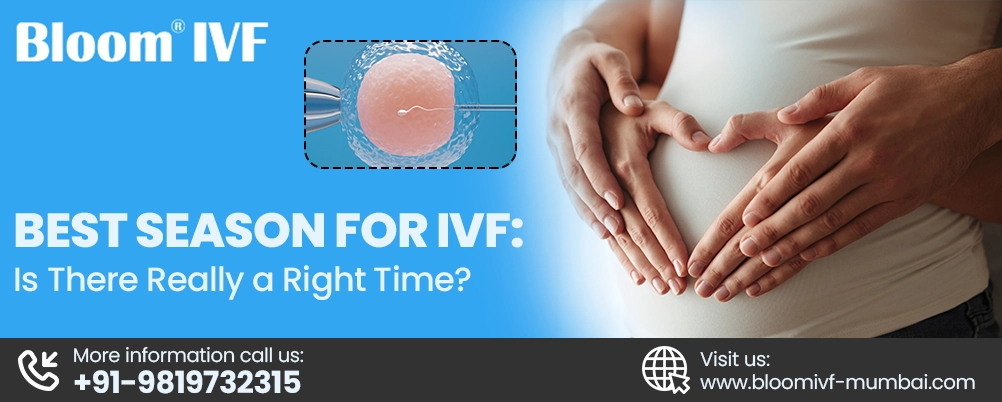This is a very practical question, especially in cities like Mumbai where weather patterns shift between hot summers, heavy monsoons, and mild winters. It is natural for couples to wonder if the time of year could influence their chances of conceiving.
The short answer, according to standard infertility textbooks and international guidelines (ASRM, ESHRE, RCOG), is there is no specific best season for IVF. IVF outcomes depend on medical and biological factors rather than the calendar. However, a closer look at science, research, and patient perspectives helps clarify this question in detail.
Table of Contents
ToggleWhat Textbooks and Guidelines Say
Speroff’s Clinical Gynecologic Endocrinology & Infertility, Gardner’s Assisted Reproductive Techniques, and the ESHRE/ASRM guidelines clearly state:
IVF success is determined by female age, ovarian reserve, quality of gametes/embryos, stimulation protocols, and endometrial receptivity.
Seasonal variation is not a factor in routine practice.
IVF can be performed year-round in any menstrual cycle
Modern IVF laboratories are designed with strict temperature, humidity, and air quality controls, ensuring that external weather (whether Mumbai’s summer heat or monsoon humidity) does not affect gametes or embryos.
Thus, in standard practice, the best time to undergo IVF is when the couple is medically, emotionally, and financially ready—not when the calendar dictates.
Also read: Donor Egg Success Rates By Age
Why Do Some Studies Suggest Seasonal Effects?
Although guidelines do not recommend planning IVF by season, a few studies have observed small differences:
1. Spring and Summer Advantage
Some studies reported slightly higher fertilization and pregnancy rates in spring and summer months.
Possible reasons:
Higher Vitamin D levels: Sunlight exposure improves vitamin D, which may support endometrial receptivity and ovarian function.
Hormonal rhythms: Seasonal changes in melatonin and circadian biology might subtly affect reproductive hormones.
2. Winter and Monsoon Considerations
In regions with extreme cold or excessive humidity, lab conditions may be harder to maintain.
However, in advanced centers (such as in Mumbai), IVF laboratories are well-equipped with HEPA filtration, controlled temperature, and incubator monitoring systems, so seasonal effects are neutralized.
Mumbai Context: Does Season Matter Here?
Mumbai has a tropical climate with hot summers, humid monsoons, and mild winters. For IVF patients, each season may raise practical questions:
Summer (March–May):
Concerns about extreme heat affecting embryo labs are unfounded—modern labs are fully climate-controlled.
Monsoon (June–September):
Travel to clinics may be inconvenient due to heavy rains, but treatment outcomes remain unaffected.
Winter (October–February):
A comfortable season for travel and reduced infections, but medically, outcomes are the same as other months.
Hence, in Mumbai, the season does not influence IVF success. What may matter more is personal convenience (avoiding travel during floods, for example), not biological differences.
The Real “Best Time” for IVF
Instead of asking about the best season, couples should focus on the best timing in their fertility journey.
1. Female Age
- Success is highest when IVF is done before the age of 35.
- After 37, ovarian reserve declines and outcomes drop significantly.
- So, earlier is always better if age is a concern.
2. Ovarian Reserve
- Women with low AMH or low antral follicle count should not delay treatment.
- Waiting for a “better season” could reduce chances further.
3. Underlying Fertility Condition
- In severe male factor infertility, blocked tubes, or failed IUIs, IVF should be considered sooner rather than later.
4. Medical Optimization
- Conditions like hypothyroidism, diabetes, PCOS, or endometrial pathology should be treated before starting IVF, regardless of the season.
5. Emotional and Financial Readiness
- IVF is a demanding process. Couples should begin when they are prepared to commit to the treatment emotionally and financially.
Advances That Overcome Seasonal Influence
Modern IVF practices have eliminated any real seasonal impact through technology:
Controlled laboratory environments with strict air handling units (AHU).
Incubators with stable pH, temperature, and CO₂ control independent of outside weather.
Cryopreservation (freezing) allows embryos to be stored and transferred at the most suitable time for the patient.
Personalized stimulation protocols mean cycles can be planned around the patient’s convenience.
These advances ensure that a couple in Mumbai can pursue IVF in any month with equal chances of success.
Also read: IVF treatment in Mumbai
Counseling Couples: A Practical Script
When patients ask “Doctor, should we wait until summer or winter for IVF?”, here’s a simple way to explain:
IVF success does not depend on the season. In Mumbai, labs are fully climate-controlled, so your embryos are safe throughout the year. The best time for IVF is when you are medically ready, especially if your age or ovarian reserve suggests we should not delay.”
This balances scientific accuracy with reassurance.
Conclusion
The idea of a “best season” for IVF is a common myth among couples. While a few studies hint at minor seasonal differences, standard infertility textbooks and guidelines (ASRM, ESHRE, RCOG) are clear: IVF success is not season-dependent.
Modern IVF centers in Mumbai, including Bloom IVF, operate year-round with consistent success rates. The true best time for IVF is when the couple is biologically, medically, and emotionally ready — not based on the calendar.
In summary, whether it is summer, monsoon, or winter in Mumbai, the right time for IVF is now, when your fertility status indicates readiness.

